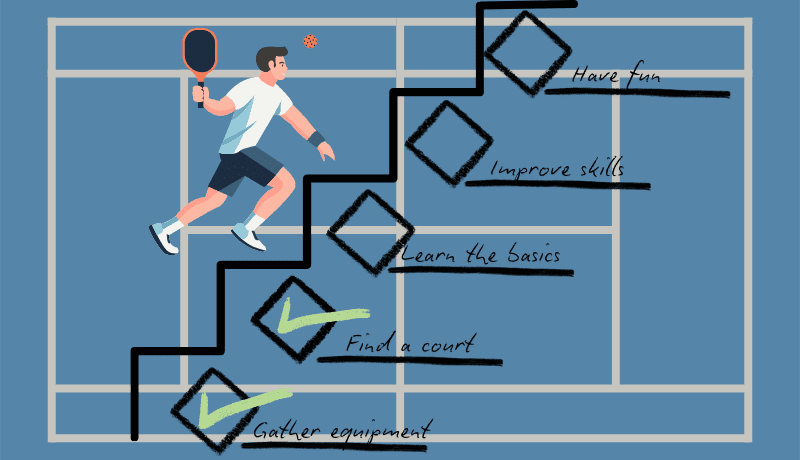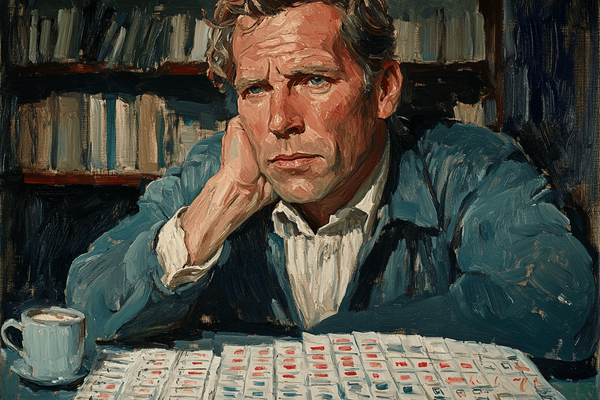So Real List. Stress Coping Techniques from a Schoolteacher
We all experience stress. Teachers experience more stress than ordinary people. How do they handle it? Let's find out.

A Guest Post on “So List”
When a new guest appears on a blog, it’s not — no, it’s not stress — it’s a joy. It means readers will have the opportunity to explore a fresh perspective on lists or discover a new, helpful list.
Today’s guest is Olga, who describes herself as a teacher, journalist, and simply a funny person. Olga has her Telegram channel, “Mad Mother” (in Russian), where she uses sharp wit and compelling stories to share life experiences, teaching insights, and occasional advice to benefit her readers.
One of these pieces of advice has made its way into this blog. It’s a great list of simple actions that can help lower stress levels in everyday life. A skeptical reader who feels stressed a lot now might argue that advice won’t help and would prefer something stronger to cope with stress.
This blog isn’t about how to drink alcohol — except maybe just a little. Here’s an observation: people under chronic stress often lack a well-established self-care routine. It’s worth addressing the basics before reaching for stronger remedies. So let’s do the deep breathing and start.
The Story Behind This Stress-Management Practice List
When Olga started teaching, she was completely immersed in the process. Her state was such that she ate little, slept poorly, and barely exhaled. While pushing oneself hard may be sustainable for a short while, ongoing high-intensity effort is unsustainable.
You usually don’t want to feel overwhelmed so much that the only what’s left is the fight or flight response. Consistent and unmanaged stress might undermine the immune system and lead to serious illness.
At the time of being deep intro stress, it might seem everything is under control: the body’s stress response muted, problems evoke no emotional reaction, and resources seem sufficient to “push through.” But others may notice signs of burnout before you do. Continuous high pressure is detrimental to physical and mental health. And usually the goal is to stay on the healthy ways of living to maintain the good quality of life.
At some point, Olga realized she had exhausted her energy. She needed to recharge, so she developed a personal list of techniques to manage stress. Instead of “fighting stress,” her philosophy focused on redirecting stress energy into supportive tools. Once again let’s do the deep breath and move on.
So, the List of Olga’s Stress-Coping Strategies
This list is dedicated to all workaholics and anxious souls who’ve forgotten about their body’s needs and desires.
Drink Water
Despite constant reminders, many of us neglect hydration. Keep water easily accessible. As Olga writes:
I’m one of those who constantly neglects hydration, but with reminders, I find I have fewer headaches and more energy at the end of the day.
Drinking water when I was nervous or nauseated from exhaustion felt like a small gesture of self-love. It helped.
Hydration has a wonderful side benefit for those with sedentary lifestyles: it makes you get up frequently. Regular physical activity is essential for reducing stress hormones, stabilizing heart rate and blood pressure, and improving physical health. Staying seated for hours increases the risk of serious health problems by 11% for every continuous hour of sitting [1].
Move Around
One paragraph is not enough for the importance of walking. It is important to get up from a chair so that the buttocks take rounded shapes again, and would not be flat from sitting and tension. It's a great thing to go look out the window for half a minute. Compensates for prolonged staring at screens and notebooks.
Getting up from your seat helps restore physical and mental equilibrium. Regular exercise will surely make it better, but at least take half a minute to gaze out a window or stretch. If a full walk isn’t possible, find a way to step away from your desk. Even gossiping with a colleague, often dismissed as trivial, serves a purpose [2]:
The gossip theory might sound like a joke, but numerous studies support it. Even today, the vast majority of human communication — whether in the form of emails, phone calls or newspaper columns — is gossip. It comes so naturally to us that it seems as if our language evolved for this very purpose.
<...>
Gossip usually focuses on wrongdoings. Rumormongers are the original fourth estate.
Sharing negative thoughts with your colleagues or family member might be a working way to relieve stress. Social support is essential.
Engage in Touch
Simple tactile actions can relieve muscle tension caused by stress. Olga recommends:
When your mind is overactive, reconnecting with your body is vital. A quick ear or hand massage, or stretching your neck, can work wonders.
These stress-coping techniques improve emotional equilibrium without requiring medical intervention.
Nourish Yourself
In programming there is a principle called “garbage in, garbage out” [3]. A healthy diet is essential to physical and mental well-being. Poor nutrition can exacerbate stress and fatigue, making daily life even harder to manage.
Where would you get a positive attitude, and how can you handle life's stressors if the food that you put into your mouth is a low-quality one and heavily processed food? A well-balanced diet might not always be available for you, or there might be the irritable bowel syndrome, but if there are no concrete obstacles to healthier food, it’s definitely worth considering. Well-nourished bodies do better.
Perform a Body Scan
A mental body scan, starting from your head to your feet, can help identify what your body needs — whether it’s stretching, hydration, or rest.
This mindfulness technique is a quick and effective way to cope with stress, even amidst a busy schedule.
Take Breaks
Those new to productivity systems often over-schedule themselves. Over time, they realize the importance of taking breaks. As composer Claude Debussy once noted, music is the silence between the notes. Similarly, life needs pauses to maintain balance and avoid burnout.
The world won’t fall apart if you step away for a moment to breathe and relax.
Have Enough Sleep
Sleep is essential for lowering stress and avoiding emotional exhaustion. Poor sleep quality heightens the body’s stress response, undermines mental health, and makes handling life’s challenges even harder. While life’s circumstances may sometimes interfere, don’t let bad habits perpetuate the cycle.
Closing Thoughts on Managing Stress
Stressful situations are inevitable, and everyone experiences stress, but having effective relaxation techniques helps you handle life’s challenges with resilience.
Thank you for reading! Special thanks to Olga for her valuable recommendations.
Want more advice? Subscribe to “So List” for strategies to improve daily life with simple lists and checklists. For example, learn how to boost self-confidence with 30 checklist items.
List of Links
[1] Joe Kutner, The Healthy Programmer, ISBN 9781937785314
[2] Yuval Noah Harari, Sapiens: A Brief History of Humankind, ISBN 9780099590088
[3] GIGO from Wikipedia



